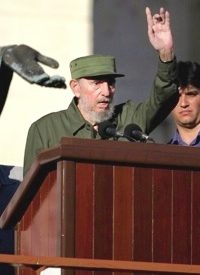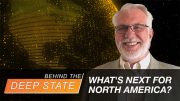
Goldberg describes his reaction in his Atlantic article of September 8:
I asked Julia [Sweig] to interpret this stunning statement for me. She said, “He wasn’t rejecting the ideas of the Revolution. I took it to be an acknowledgment that under ‘the Cuban model’ the state has much too big a role in the economic life of the country.”
Julia pointed out that one effect of such a sentiment might be to create space for his brother, Raul, who is now president, to enact the necessary reforms in the face of what will surely be push-back from orthodox communists within the Party and the bureaucracy. Raul Castro is already loosening the state’s hold on the economy. He recently announced, in fact, that small businesses can now operate and that foreign investors could now buy Cuban real estate. (The joke of this new announcement, of course, is that Americans are not allowed to invest in Cuba, not because of Cuban policy, but because of American policy. In other words, Cuba is beginning to adopt the sort of economic ideas that America has long-demanded it adopt, but Americans are not allowed to participate in this free-market experiment because of our government’s hypocritical and stupidly self-defeating embargo policy. We’ll regret this, of course, when Cubans partner with Europeans and Brazilians to buy up all the best hotels).
Goldberg described Julia Sweig earlier in his article as “the friend I brought with me to make sure, among other things, that I didn’t say anything too stupid.” In Part I of the article, published the previous day, Goldberg stated that upon receiving Castro’s invitation to come to Cuba for the interview a couple of weeks earlier, he had “called a friend at the Council on Foreign Relations (CFR], Julia Sweig, who is a preeminent expert on Cuba and Latin America.” (Goldberg is not, himself, a member of the CFR, a New York-based think tank and public advocacy organization that has had an uninterrupted, powerful influence on U.S. foreign policy since the administration of Franklin D. Roosevelt.)
Sweig has written a historical analysis of the island nation entitled Cuba: What Everyone Needs to Know, published last year by Oxford University Press. In the Acknowledgments section of her work, the author noted: “The Council on Foreign Relations provides a fruitful atmosphere for an endeavor of this nature. My thanks go especially to CFR’s president Richard Haass and the entire staff of the studies department.”
Sweig’s flattering description of Castro in her book’s Introduction made us wonder if it was she who paved the way for Goldberg’s visit, not vice versa. (Our suspicions were confirmed after reading Goldberg’s description of their meeting with Castro: “He greeted Julia warmly; they have known each other for more than twenty years.”) Sweig writes:
It wasn’t that Fidel had evaporated: He made the revolution, and is widely recognized as responsible for its successes and failures. But on this [2008] visit, I saw and felt that Cuba is a country that is moving on. And credit is due to Fidel Castro, because as much as his personality dominated the revolution and everything in Cuba for so long, what was evident from this visit is that he has left in place an institutionalized state and government that, even if inefficient and lacking in transparency, can and does function without him. The revolution, it turns out, is not a product of charisma and repression alone.
Back to Goldberg’s interview, AP reported that the journalist had “traveled to Cuba at Castro’s invitation last week to discuss a recent Atlantic article he wrote about Iran’s nuclear program, and had also reported on [September 7] that Castro questioned his own actions during the 1962 Cuban Missile Crisis, including his recommendation to Soviet leaders that they use nuclear weapons against the United States.”
The Miami Herald quoted from an e-mail Goldberg sent to its staff on September 8 describing Castro’s surprising statement admitting the shortcomings of Cuba’s state-controlled economy: “He said it in an off-hand way, but not jokingly,” Goldberg related. ”I think this was an honest recognition on his part that his brother must re-order Cuban’s economic system in order to keep the country afloat.”
The Herald also quoted the reaction of Jaime Suchlicki, described as a long-time Castro observer and head of the University of Miami’s Research Institute for Cuban Studies, who said:
He is either crazy or senile. This certainly does not sound like something Castro would say. But if he was quoted accurately, then I guess he’s come to the realization, like everyone else, that Marxist-Leninist governments do not function. So the real question is, what is he going to do about it now? Is he going to bring about change in Cuba since the Cuba model doesn’t work?
The semi-retired dictator (Fidel remains the head of Cuba’s Communist Party, and only the politically naïve would think he exerts less than considerable influence with brother Raul) has made other uncharacteristic statements of late. On August 18, he used three pages of Cuba’s Communist Party newspaper, Granma, to quote — practically verbatim — from a 2006 book, The Secrets of the Bilderberg Club, by the Lithuanian-born writer Daniel Estulin. In that work, Estulin argues that the internationalist Bilderberg group (which some compare to the CFR, but that is actually even more secretive and powerful) largely runs the world. It was a curious source for the world’s longest-reigning communist leader to cite. Then, during his interview with Goldberg, Castro charged Mahmoud Ahmadinejad, the President of Iran, with being anti-Semitic. The main topic discussed in that interview was the Middle East, especially the threat of a nuclear-armed Iran.
During their meeting, Castro told Goldberg he had read the latter’s “recent Atlantic article carefully, and that it confirmed his view that Israel and America were moving precipitously and gratuitously toward confrontation with Iran.”
In typical internationalist, one-world fashion, Castro told the journalist that Israel will only have security if it gives up its nuclear arsenal, and the rest of the world’s nuclear powers will only have security if they, too, give up their weapons.
The statement is extraordinary when one considers it against the backdrop of a similar proposal made by Castro’s one-time supposed adversary during the 1962 Cuban Missile Crisis, President John F. Kennedy. Popular accounts of the crisis have convinced most people that the world stood at the brink of nuclear annihilation, as the American President and the Cuban dictator’s protector state, the Soviet Union, faced off. And while most Americans believe that the Soviets backed down, it was in fact, the United States that gave up the lion’s share of concessions to settle the crisis. In exchange for the Soviet agreement to dismantle the offensive weapons and return them to the Soviet Union — which was never unequivocally verified — the United States agreed to never invade Cuba and also to remove its long-range ballistic missiles from Italy and Turkey.
And if Castro believes that the world’s nuclear powers will only have security if they, too, give up their nuclear weapons, he has much more in common with President Kennedy than the world realizes.
On September 25, 1961, President Kennedy presented to the 16th General Assembly of the United Nations a disarmament proposal entitled Freedom From War: The United States Program for General and Complete Disarmament in a Peaceful World (State Department Publication 7277).
Excerpts from the document include:
• “As states relinquish their arms, the United Nations shall be progressively strengthened in order to improve its capacity to assure international security.”
• “By the time Stage II [of the three-stage disarmament program] has been completed, the confidence produced through a verified disarmament program … and the development of strengthened international peace-keeping processes within the framework of the U.N. should have reached a point where the states of the world can move forward to Stage III. In Stage III progressive controlled disarmament and continuously developing principles and procedures of international law would proceed to a point where no state would have the military power to challenge the progressively strengthened U.N. Peace Force.” (Emphasis added.)
One more noteworthy fact: President Kennedy was a member of the CFR, the organization that one of Fidel’s favorite American researcher-writers, Julia Sweig, is so firmly connected with.
Photo: Cuba’s leader Fidel Castro greets thousands of students after delivering a speech outside Havana’s University in Havana, Cuba, Sept. 3, 2010.: AP Images



